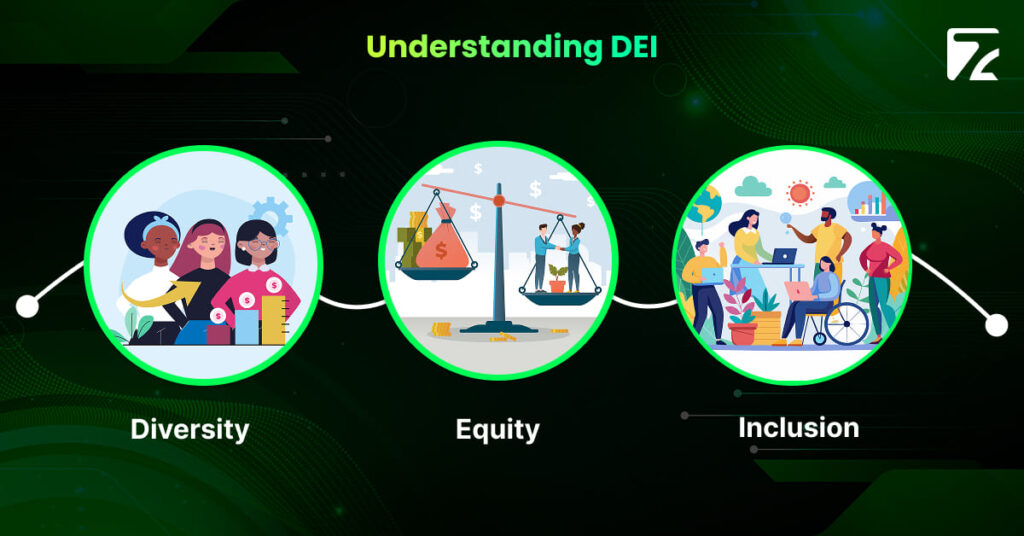Empowering Workplaces Through DEI: A Strategic Approach to Inclusivity

Empowering Workplaces Through DEI: A Strategic Approach to Inclusivity [boomdevs_toc] In today’s interconnected world, Diversity, Equity, and Inclusion (DEI) have become essential components of a thriving workplace. DEI is not merely a corporate responsibility but a strategic necessity that drives innovation, employee engagement, and long-term success. However, the journey toward a truly inclusive workplace is complex and ongoing, requiring thoughtful strategies and a commitment to continuous improvement. This article will explore the importance of DEI, the challenges of implementation, and actionable steps that organizations can take to create a more inclusive and equitable workplace. Understanding DEI: Diversity, Equity, and Inclusion Breaking Down the Acronym: Diversity, Equity, and Inclusion At its core, DEI stands for Diversity, Equity, and Inclusion: Diversity is the presence of differences within a given setting. In the workplace, this includes differences in race, gender, age, ethnicity, religion, disability, sexual orientation, education, and more. Diversity also encompasses cognitive diversity, which refers to the different ways people think, solve problems, and approach their work. Equity goes beyond equality by ensuring that individuals have access to the specific resources and opportunities they need to succeed, acknowledging that everyone’s starting point is different. While equality provides the same resources to all, equity considers individual needs and circumstances. Inclusion involves creating an environment where everyone feels valued, respected, and empowered to contribute. It’s about fostering a sense of belonging where diverse voices are not only heard but also celebrated. Why DEI is Essential for Modern Workplaces The importance of DEI in the workplace cannot be overstated. Organizations that prioritize DEI are more innovative, better at problem-solving, and have higher employee satisfaction and retention rates. But beyond these benefits, DEI is about creating a workplace that mirrors the diverse world we live in—a place where everyone has the opportunity to thrive. At Zeal Connect, DEI is not just a set of policies but a core part of the company’s mission. By focusing on creating job opportunities in rural areas, Zeal Connect ensures that talent from these regions is not overlooked, thereby fostering a more diverse and inclusive workforce. The Evolution of DEI in the Workplace Historical Overview The journey toward DEI in the workplace has been a long one, marked by significant milestones. Initially, diversity efforts were primarily driven by legal requirements and the need to avoid discrimination lawsuits. Companies focused on compliance, often doing the bare minimum to meet legal standards. Moving Beyond Compliance to a Strategic Imperative In recent years, however, the approach to DEI has evolved. Forward-thinking organizations recognize that diversity is not just about meeting legal requirements; it’s a strategic imperative that can drive business success. By actively seeking out diverse talent and fostering an inclusive environment, companies can enhance their innovation capabilities, attract top talent, and build stronger relationships with customers and partners. Zeal Connect exemplifies this shift by not only embracing diversity but also actively working to bridge the gap between rural and urban employment opportunities. By doing so, the company not only meets its DEI goals but also contributes to the broader social good. Zeal Connect’s Approach to DEI Bridging the Gap Between Rural and Urban Talent Zeal Connect’s unique approach to DEI involves creating job opportunities in rural areas, ensuring that talent from these regions is integrated into the global workforce. This initiative not only addresses the employment challenges faced by rural communities but also enriches the company with diverse perspectives and skills that might otherwise be overlooked. By leveraging technology and innovative business practices, Zeal Connect connects rural talent with job opportunities that were traditionally concentrated in urban areas. This approach not only benefits the company but also contributes to the economic development of rural regions, creating a win-win situation for all parties involved. Creating Equitable Job Opportunities Equity is a central tenet of Zeal Connect’s DEI strategy. The company recognizes that individuals from rural areas may face unique challenges, such as limited access to education and training opportunities. To address this, Zeal Connect provides targeted support, including mentorship programs, training initiatives, and flexible work arrangements that accommodate the needs of rural employees. This commitment to equity ensures that all employees, regardless of their background or location, have the resources they need to succeed. By leveling the playing field, Zeal Connect not only enhances its workforce but also contributes to a more just and equitable society. Diversity: Embracing a Range of Perspectives Types of Diversity When discussing diversity, it’s important to consider all its facets. While race and gender are often the most visible aspects, diversity also includes age, ethnicity, sexual orientation, religion, disability, and socioeconomic background. Moreover, diversity of thought—how people think, solve problems, and approach challenges—is a crucial component of a truly diverse workplace. The Power of Cognitive Diversity Cognitive diversity refers to the different ways people think and approach problems. This form of diversity is particularly valuable in a team setting, as it leads to more innovative solutions and better decision-making. Teams that are cognitively diverse are more likely to challenge each other’s assumptions, leading to creative outcomes that might not emerge in a more homogenous group. At Zeal Connect, cognitive diversity is especially important as the company brings together talent from various rural and urban backgrounds, each offering unique perspectives and approaches to problem-solving. Equity: Ensuring Fair Opportunities for All Equity vs. Equality Understanding the difference between equity and equality is crucial for creating a fair and inclusive workplace. Equality involves treating everyone the same, regardless of their starting point. In contrast, equity involves providing individuals with the specific resources and opportunities they need to succeed, recognizing that different people have different needs. For example, in a workplace, equality might mean offering the same training program to all employees. However, equity would involve tailoring that training to meet the unique needs of different individuals, such as offering additional support to those who may have less experience or access to resources. Strategies for Implementing Equity in the Workplace Implementing equity requires a proactive approach. This might include conducting regular pay
